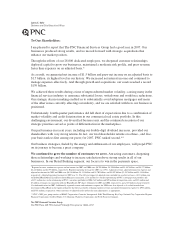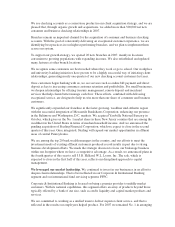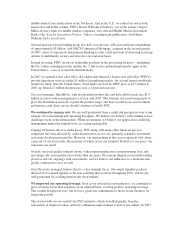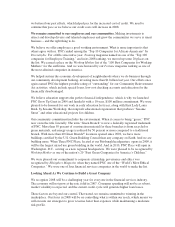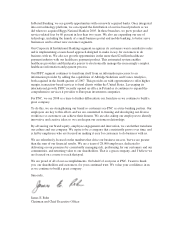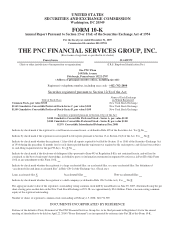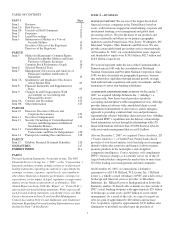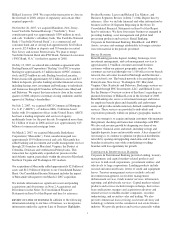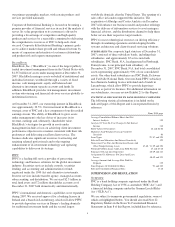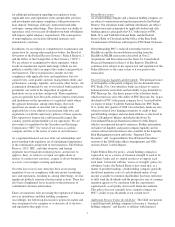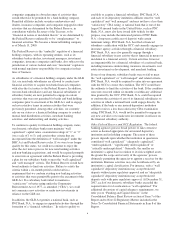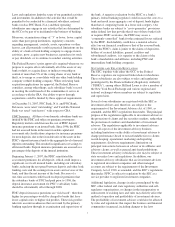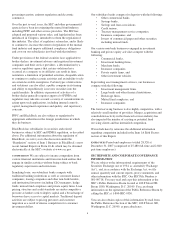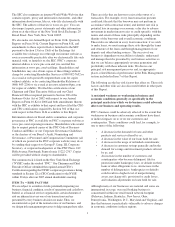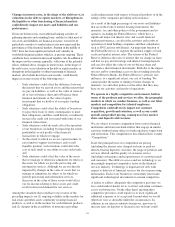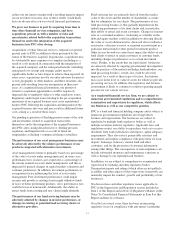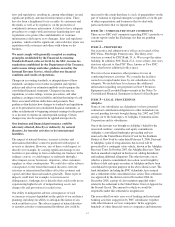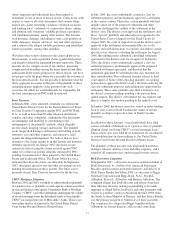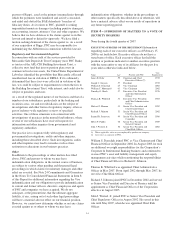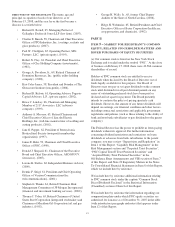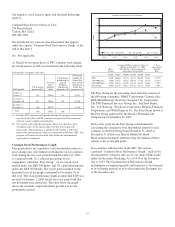PNC Bank 2007 Annual Report Download - page 11
Download and view the complete annual report
Please find page 11 of the 2007 PNC Bank annual report below. You can navigate through the pages in the report by either clicking on the pages listed below, or by using the keyword search tool below to find specific information within the annual report.
companies engaging in a broader range of activities than
would otherwise be permitted for a bank holding company.
Permitted affiliates include securities underwriters and
dealers, insurance companies and companies engaged in other
activities that are determined by the Federal Reserve, in
consultation with the Secretary of the Treasury, to be
“financial in nature or incidental thereto” or are determined by
the Federal Reserve unilaterally to be “complementary” to
financial activities. We became a financial holding company
as of March 13, 2000.
The Federal Reserve is the “umbrella” regulator of a financial
holding company, with its operating entities, such as its
subsidiary broker-dealers, investment managers, investment
companies, insurance companies and banks, also subject to the
jurisdiction of various federal and state “functional” regulators
with normal regulatory responsibility for companies in their
lines of business.
As subsidiaries of a financial holding company under the GLB
Act, our non-bank subsidiaries are allowed to conduct new
financial activities or acquire non-bank financial companies
with after-the-fact notice to the Federal Reserve. In addition,
our non-bank subsidiaries (and any financial subsidiaries of
subsidiary banks) are now permitted to engage in certain
activities that were not permitted for banks and bank holding
companies prior to enactment of the GLB Act, and to engage
on less restrictive terms in certain activities that were
previously permitted. Among other activities, we currently
rely on our status as a financial holding company to conduct
mutual fund distribution activities, merchant banking
activities, and underwriting and dealing activities.
To continue to qualify for financial holding company status,
our domestic subsidiary banks must maintain “well
capitalized” capital ratios, examination ratings of “1” or “2”
(on a scale of 1 to 5), and certain other criteria that are
incorporated into the definition of “well managed” under the
BHC Act and Federal Reserve rules. If we were to no longer
qualify for this status, we could not continue to enjoy the
after-the-fact notice process for new non-banking activities
and non-banking acquisitions, and would be required promptly
to enter into an agreement with the Federal Reserve providing
a plan for our subsidiary banks to meet the “well capitalized”
and “well managed” criteria. The Federal Reserve would have
broad authority to limit our activities. Failure to satisfy the
criteria within a six-month period could result in a
requirement that we conform existing non-banking activities
to activities that were permissible prior to the enactment of the
GLB Act. If a subsidiary bank failed to maintain a
“satisfactory” or better rating under the Community
Reinvestment Act of 1977, as amended (“CRA”), we could
not commence new activities or make new investments in
reliance on the GLB Act.
In addition, the GLB Act permits a national bank, such as
PNC Bank, N.A., to engage in expanded activities through the
formation of a “financial subsidiary.” In order to qualify to
establish or acquire a financial subsidiary, PNC Bank, N.A.
and each of its depository institution affiliates must be “well
capitalized” and “well managed” and may not have a less than
“satisfactory” CRA rating. A national bank that is one of the
largest 50 insured banks in the United States, such as PNC
Bank, N.A., must also have issued debt (which, for this
purpose, may include the uninsured portion of PNC Bank,
N.A.’s long-term certificates of deposit) with certain
minimum ratings. PNC Bank, N.A. has filed a financial
subsidiary certification with the OCC and currently engages in
insurance agency activities through a financial subsidiary.
PNC Bank, N.A. may also generally engage through a
financial subsidiary in any activity that is financial in nature or
incidental to a financial activity. Certain activities, however,
are impermissible for a financial subsidiary of a national bank,
including insurance underwriting, insurance investments, real
estate investment or development, and merchant banking.
If one of our domestic subsidiary banks were to fail to meet
the “well capitalized” or “well managed” and related criteria,
PNC Bank, N.A. would be required to enter into an agreement
with the OCC to correct the condition. The OCC would have
the authority to limit the activities of the bank. If the condition
were not corrected within six months or within any additional
time granted by the OCC, PNC Bank, N.A. could be required
to conform the activities of any of its financial subsidiaries to
activities in which a national bank could engage directly. In
addition, if the bank or any insured depository institution
affiliate receives a less than satisfactory CRA examination
rating, PNC Bank, N.A. would not be permitted to engage in
any new activities or to make new investments in reliance on
the financial subsidiary authority.
Other Federal Reserve and OCC Regulation. The federal
banking agencies possess broad powers to take corrective
action as deemed appropriate for an insured depository
institution and its holding company. The extent of these
powers depends upon whether the institution in question is
considered “well capitalized,” “adequately capitalized,”
“undercapitalized,” “significantly undercapitalized” or
“critically undercapitalized.” Generally, the smaller an
institution’s capital base in relation to its risk-weighted assets,
the greater the scope and severity of the agencies’ powers,
ultimately permitting the agencies to appoint a receiver for the
institution. Business activities may also be influenced by an
institution’s capital classification. For instance, only a “well
capitalized” depository institution may accept brokered
deposits without prior regulatory approval and an “adequately
capitalized” depository institution may accept brokered
deposits only with prior regulatory approval. At December 31,
2007, each of our domestic subsidiary banks exceeded the
required ratios for classification as “well capitalized.” For
additional discussion of capital adequacy requirements, we
refer you to “Funding and Capital Sources” in the
Consolidated Balance Sheet Review section of Item 7 of this
Report and to Note 22 Regulatory Matters included in the
Notes To Consolidated Financial Statements in Item 8 of this
Report.
6

